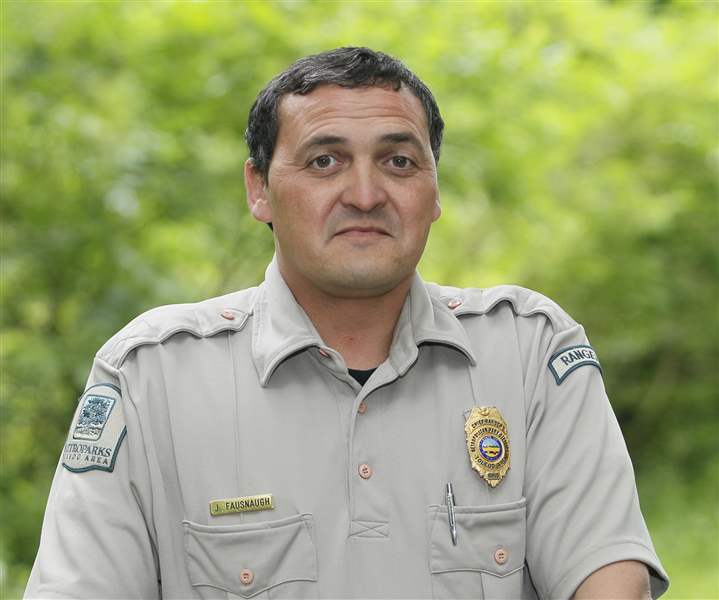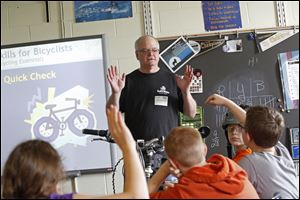
TOLEDO AREA
Bicyclists can ride parks’ paved trails after hours
Special permits to give access to certain paths
6/3/2013
Joe Fausnaugh, chief of operations at the Metroparks, said the new policy means cyclists may use the parks district’s paved-trail system in Lucas County at night to bike to work, school, church, or other nonrecreation activities.
The Blade/Jetta Fraser
Buy This Image

Sylvania Township resident Keith Webb is among the first trail users to obtain the after-hours permit. He said he routinely rides the University/Parks Trail for bike commuting and to attend night programs at Epworth United Methodist Church on West Central Avenue, and often must ride home in the dark — especially during the winter months.
After years of a curfew on all-purpose trails, the Metroparks of the Toledo Area will allow after-hours access to bicycle commuters who obtain special permits.
Joe Fausnaugh, chief of operations at the Metroparks, said the new policy means cyclists may use the parks district’s paved-trail system in Lucas County at night to bike to work, school, church, or other nonrecreation activities.
The permits, which are free, may be used on the North and South forks of the Wabash Cannonball and University/Parks trails. However, the Tow Path, which runs along the Maumee River, connecting Farnsworth, Bend View, and Providence Metroparks, is not part of the special permit.
Mr. Fausnaugh said the parks district decided to offer the permit system after meeting with bicycling enthusiasts and investigating how other parks districts in the state handle nighttime use.
A bicycling advocate familiar with the federal transportation program used to acquire and build the rails-to-trails projects in the parks district alerted Mr. Fausnaugh that the Metroparks might be unintentionally ignoring funding requirements by limiting commuters’ access to the trails.
“We sat down with individuals from several local bicycling organizations and had a discusssion on what we could do to come into compliance with the funding requirements and change the rules,” Mr. Fausnaugh said.
He said the parks district is faced with balancing the desires of bicyclists who want to commute with the concerns of residents along the 25 miles of trail the district maintains.
As of last week, the parks district had issued seven permits to cyclists, who are being asked to display the special tags on their bicycles so Metroparks rangers or other law enforcement that patrol the trails can see them.

Joe Fausnaugh, chief of operations at the Metroparks, said the new policy means cyclists may use the parks district’s paved-trail system in Lucas County at night to bike to work, school, church, or other nonrecreation activities.
Mr. Fausnaugh said his research of the ways other parks districts in Ohio handle after-hours use of converted railroad lines revealed some restrict hours of use, but don’t enforce the rule.
“I wasn’t comfortable with that. I didn’t feel that was the most responsible way to handle it,” he said. “By issuing permits, we will still allow people who want to use the trails after hours to do so. But we can also manage the responsibility we have to our neighbors. This way, we know who is out there and we have given them permission to be there.”
When riding the trails at night, bicyclists must follow the same laws as if they were riding on public roadways, including obeying traffic signs and using front and rear lights.
In the past, Metroparks rangers encountering bicyclists at night on the trails gave warnings, Mr. Fausnaugh said.
“What was happening was very much an education-centered policy. If we found someone on the trai, we stopped them and reminded them that the trail was closed after dark,” he said.
Sylvania Township resident Keith Webb is among the first trail users to obtain the after-hours permit. He said he routinely rides the University/Parks Trail for bike commuting and to attend night programs at Epworth United Methodist Church on West Central Avenue, and often must ride home in the dark — especially during the winter months.
“I applaud Toledo Metroparks for recognizing that the trail systems are in fact transportation corridors, meant to be used in conjunction with other roadways. This is another step in making Toledo a great place to ride your bike,” said Mr. Webb, a board member of the Ohio Bicycle Federation. “Providing after-hours access offers more options for people to ride their bike to work, school, shopping, or anywhere you might take your car.”
The permits can be obtained by downloading an application at metroparkstoledo.com.
Contact Mark Reiter at: markreiter@theblade.com or 419-724-6199.